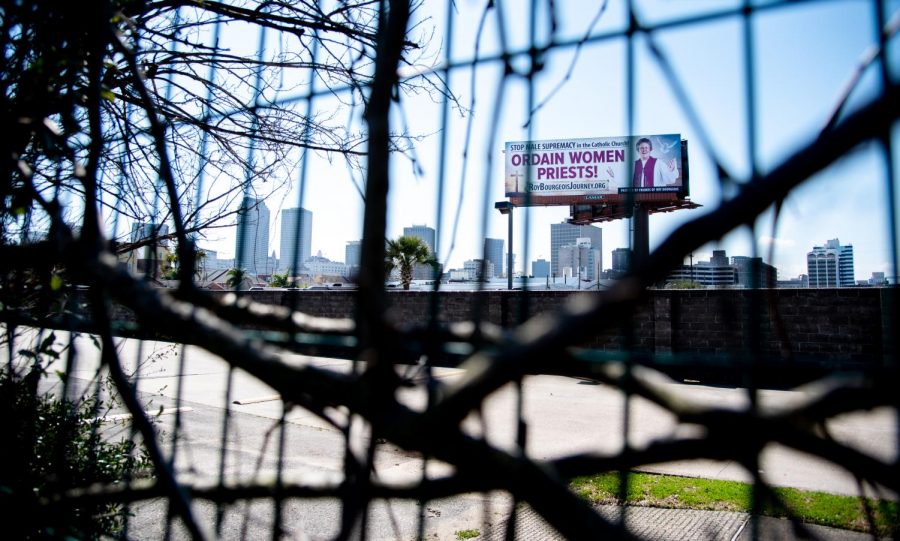Billboard keeps conversation about women’s ordination alive
A billboard funded by Roy Bourgeois calling for the ordination of women priests stands in front of downtown New Orleans. Bourgeois was expelled from the priesthood for his advocacy of ordaining women. Photo credit: Michael Bauer
February 26, 2021
Roy Bourgeois, the founder of School of Americas Watch, has funded two billboards in New Orleans to promote the ordination of women in the Catholic Church. While the billboards have only been up for a couple of months, the argument surrounding women ordination has been going on for decades.
Bourgeois, served in the Maryknoll order of priests for nearly 40 years and was laicized, or stripped of his role as a priest, because of his vocal support for women’s ordination. He became involved in the movement after some women approached him, saying they had felt the calling to become priests and felt it was wrong that they could not.
“They said, ‘We have to talk with you,’” Bourgeois said. “‘We have to talk to you about an injustice in our church, the Catholic Church. I, as a woman, am also called, like you as a man, to the priesthood.’”
There are women who have gone through the ordination process, explained Jennifer Molina, the New Orleans contact for the Women’s Ordination Conference.
“Women Catholic priests are already here,” she said. “They’re not recognized by the Vatican, but they are Catholic women who have been ordained.”
It was after Bourgeois gave the homily for the ordination ceremony of one of these women, Reverend Janice Sevre-Duszynska, that he was told he would be laicized unless he publicly recanted his support of women’s ordination. He refused, and was expelled from the priesthood in 2012.
The Church’s official standing is that women cannot be priests, but can serve as nuns, religious sisters or abbesses. It was officially reiterated in 1991 by Pope John Paul II, and the Archdiocese of New Orleans further supported that stance in a statement to The Maroon.
“The Catechism of the Church states, ‘The Lord chose men to form the college of the twelve apostles, and the apostles did the same when they chose collaborators to succeed them in their ministry,’” the statement said, citing paragraph 1577 of the Catechism. “‘The Church recognizes herself to be bound by this choice made by the Lord himself. For this reason the ordination of women is not possible.’”
Nathan O’Halloran, S.J, director of the Catholic Studies program, broke down what that meant.
“Our job as the Church—this is what the Magistarian says— is simply to safeguard Jesus’s teaching,” O’Halloran explained. “If we think that this was the intention of Jesus, we have no authority, even the Pope, to change that.”
This is where Bourgeois disagreed, saying that God made men and women of “equal worth and dignity.” He believes the root of the issue lies in a power dynamic.
“The problem was not with God, but with this all-male priesthood that became addicted to power,” said Bourgeois. “I began to see that so clearly, that we as an all-male priesthood, see women as a threat to our power.”
The Archdiocese of New Orleans rejected this idea.
“Through the centuries women have played an important role in the ministry of the church,” the statement from the Archdiocese read. “This has increased significantly in recent years both in the local church and in the Vatican…Today, the church is enriched by the ministry of women, both religious and lay, who use their gifts and talents to support the ministry of church parishes, schools, and other vital ministries in service to the people of God.”
Molina supported Bourgeois, saying that she feels the lack of women priests is bigger than the Catholic church.
“It sends a message that women are inferior, that for some reason we are not worthy of that role,” said Molina.
That is why Bourgeois decided to put “Stop Male Supremacy in the Catholic Church” on the billboards. These boards were commissioned at the start of the pandemic, when it became unsafe to gather for in-person protests or talks.
“It’s an educational tool, it’s an organizing tool and it’s trying to help raise the temperature on this issue,”said William Quigley, professor of law and former director of the Loyola law clinic and the Gillis Long Poverty Law Center, at Loyola, who became active in the push for women’s ordination after meeting Sevre-Duszynska.
While Bourgeois funded the two billboards in New Orleans, Molina has been able to raise about $4,900 to get more billboards put up across the country to keep the dialogue about women’s ordination going.
“People are going to look back and say ‘How could the people in 2021 have thought that this was acceptable and not insisted that it be changed to become more just and equitable?’” said Quigley.









true Catholic • Mar 5, 2021 at 3:16 pm
So clearly your anger against the Roman Catholic Church is due to something far greater than women not being priests. Taking the word of a disgraced priest and trying to bash the Roman Catholic Church shows what you believe. Clearly you are not a true Catholic since you disagree with so many of their teachings which have been around for centuries. The Blessed Mother was not called to be a priest. The reason is not power dynamic which I believe you know but instead of recognizing or tyring to learn this. You find it is easier to simply cry sexism. I agree its not rocket science. Women should not be priests. There are cathechism teachings that explain this and blaming the inspired word of God as sexist because it was revelaed to a man shows your bias and ingorance. Why can men not be inspired by God? Why can men not be unbiased or unthreatened by women? Why can’t this just be how God wants it to be? Ultimately, all of us are called to ministry in our own ways and if being in another religious order is not enough for some then they should probably examine the reasons they need the title Priest to be happy. Ultimatley, I cannot calimt o understand why they feel that way and since i have not spoken to them or read anyting else along these lines besides the 3 sentences above, I reserve my judgement on that matter.
Either way, the Roman Catholic Church works for equality and helping further the dignity of all people.
However, given that you feel so strongly on the biased and perversion of the Roman Catholic Church since men are invovled, I would recomend you find another relgion that is more easily changed in order to satisfy the qualifiations of those that complain instead of trying to remain faithful to God’s teaching.
Lastly, the fact you can’t even take the time to type out Roman Catholic Church shows your obvious anger and hatred for this organization. Because of that people like myself will likely recognize you as some “Catholic” that never goes to Church and ignores teachigns that are too difficult to follow or rather some new progessive that is trying to change things in order to fit the current world view. Again this is quite obvious from the way you uncapotolize Church in your previous post.
If you are truely this upset, then leave. The Catholic Church will welcome you back if you choose to come back but ultimately it will not force you to stay. However, spreading hate and attacking relgion shouldn’t be tolerated especially when clear biase is shown. Ultimately this is a form of discrimination you are spreading because you clearly dislike the Catholic Church for having men invovled.
I don’t say any of these things to try to dismiss you or isnult you or silence your voice. I say this becasue clearly the Roman Catholic Church is a source of anger. However, I won’t sit by as someone clearly attacks an institution that I hold dear becasue they are willing to take one disgraced former priest’s word over the entire Chruch’s teaching. That doesn’t make the Church sexist, it makes the former priest wrong.
Ultimately men and women are made equal but they can and do have different duties for the Church. If that is too hard to accept, then I would suggest you seek further help from a religious teacher. Obviously I would recomned a priest but given the issue yous seem to have with men in general I would suggest contacting one of the orders of nuns. This will proably not occur becasue you would have to recognize that the sisters and women invovled in the Church don’t think they are being discriminated against and then you are left with trying to fight for people who are not oppressed.
Marilu Aguilar • Feb 26, 2021 at 1:55 pm
This RC Church and this Diocese does not have to tell me about the centuries women have played an important role in church ministry. Yet they are denied to serve as ordained priests like men are to serve as pastoral and sacramental ministers; and to roles of leadership and decision-making as ordained women priests. Every excuse given for the exclusion of women from the priesthood is MAN-made…based on MAN’S biblical interpretations and inspirations, MAN’S rules, policies, laws. This is not rocket science. MEN made these biblical interpretations and laws, etc. They can change them. The RC Church is one of the oldest and largest remaining all male sexists institutions in the world with a far reach and huge influence on the lives of women. Grateful for the women who decided not to wait for the Vatican’s permission and were ordained by bishops. They are prophetic justice. Grateful also for those in working within the church to end this injustice… prophetic persistence. This movement for women’s ordination is unstoppable. Thank you, Fr. Roy for your billboard campaign.